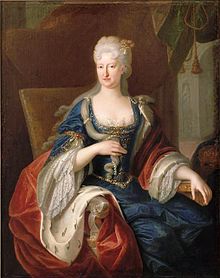Mariana of Neuburg
| Maria Anna of Neuburg | |
|---|---|

Maria Anna of Neuburg
|
|
| Queen consort of Spain | |
| Tenure | 28 August 1689 – 1 November 1700 |
| Born |
28 October 1667 Benrath Palace, Düsseldorf, Holy Roman Empire |
| Died | 16 July 1740 (aged 72) Infantado Palace, Guadalajara, Spain |
| Burial | El Escorial, Spain |
| Spouse | Charles II of Spain |
| House | House of Wittelsbach |
| Father | Philip William, Elector Palatine |
| Mother | Elisabeth Amalie of Hesse-Darmstadt |
| Religion | Roman Catholicism |
Maria Anna of Neuburg (Spanish: Mariana; 28 October 1667 – 16 July 1740) was Queen of Spain from 1689 to 1700 as the second wife of King Charles II.
Born in Benrath Palace in Düsseldorf, she was the twelfth child of Philip William, Elector of the Palatinate, and Elisabeth Amalie of Hesse-Darmstadt.
She spent her childhood in the castle of Neuburg, where she was raised by a German governess, Frau von Klau, together with her sisters Maria Sophia, Dorothea Sophia - to whom she was very close - and Hedwig Elizabeth. Her family affectionately called her Mariandl. Since an early age, she was physically attractive: tall, thin, red-haired and with a fair complexion. However, she was also known for being haughty, vain, authoritarian and selfish.
Marie Louise of Orléans, the first wife of Charles II of Spain, had died childless on 12 February 1689. Maria Anna was chosen out of the many candidates to become his second wife because her ancestors had been very fertile - her parents had 17 children. In addition, her eldest sister Eleonore was married to Emperor Leopold I so Spain's ties with the Austrian branch of the Habsburgs would become even stronger.
The marriage by proxy took place on 28 August 1689 in Ingolstadt, Germany with the attendance of her brother-in-law Emperor Leopold and her sister Empress Eleonore among other illustrious guests. However, it took Maria Anna several months to arrive in Spain, which didn't happen until the spring of 1690. She married Charles in person on 14 May 1690 in San Diego, near Valladolid. Nevertheless, this marriage also remained childless, in all probability not because she was infertile herself but because of the king's pervasive physical and mental disabilities.
...
Wikipedia
